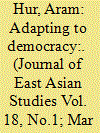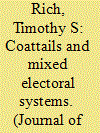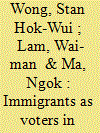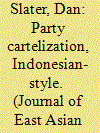|
|
|
Sort Order |
|
|
|
Items / Page
|
|
|
|
|
|
|
| Srl | Item |
| 1 |
ID:
158540


|
|
|
|
|
| Summary/Abstract |
Defection from North Korea to South Korea has increased dramatically, but little is known of its political consequences. Do North Korean defectors successfully adopt democratic norms, and if so, what factors aid this process? Through a novel survey of defectors, I find that national identification plays a significant role in motivating their fledgling sense of democratic obligation. Greater feelings of national unity with South Koreans lead to a stronger duty to vote and otherwise contribute to the democratic state. This effect is more powerful than that of conventional contractual factors, on which most state resettlement policies are based, and is surprising given that defectors’ nationalist socialization mostly took place under the authoritarian North. The findings suggest the need to reconsider integration approaches toward North Korean defectors and similarly placed refugees elsewhere.
|
|
|
|
|
|
|
|
|
|
|
|
|
|
|
|
| 2 |
ID:
158539


|
|
|
| 3 |
ID:
158535


|
|
|
|
|
| Summary/Abstract |
Japan's remarkable postwar growth spurt in the 1960s would not have been possible without Japan's alliance with the United States. Policy makers, political scientists, economists, historians, and journalists on both sides of the Pacific have made this claim, but no study has yet tested it with modern statistical methods. In this article, we compare the economic growth trajectories of Japan and a statistically constructed “synthetic” Japan, which had a similar profile until the late 1950s but did not experience the consolidation of the US–Japan alliance, a process that began in 1958 and culminated with the signing of a formal defense pact in January 1960. We find that Japan's per capita gross domestic product (GDP) grew much faster than the synthetic Japan's from 1958 to 1968. We substantiate these results with in-depth historical analyses on how the United States facilitated Japan's economic miracle.
|
|
|
|
|
|
|
|
|
|
|
|
|
|
|
|
| 4 |
ID:
158537


|
|
|
|
|
| Summary/Abstract |
To what extent do presidential candidates influence voting in mixed member legislative elections? A sizable literature addresses presidential–legislative coattail effects in the American context, with less attention given to this interaction in non-Western democracies. Nor is the role of past voting behavior adequately assessed in the literature. Taiwan's historic 2016 election allows for an analysis of the extent in which the popularity of presidential candidates influences coattail voting in the more complex electoral environment of two-vote mixed legislative systems. Evidence finds that, controlling for partisanship and previous voting behavior, voters who supported a presidential candidate were more likely to also support the party's legislative candidates, although this influence is stronger in regards to Democratic Progressive Party's Tsai Ing-wen.
|
|
|
|
|
|
|
|
|
|
|
|
|
|
|
|
| 5 |
ID:
158538


|
|
|
|
|
| Summary/Abstract |
Migration to electoral autocracies has become increasingly common. Extant studies, however, accord little attention to the immigrants' influences on the domestic politics of these regimes. We argue that immigrants have attributes (status quo bias and lack of prior exposure to local politics) that make them an attractive co-optation target of the authoritarian regime. We provide a case study of mainland Chinese immigrants in Hong Kong to illustrate our argument. Since the sovereignty transfer, the Hong Kong government has devised various schemes to attract these immigrants, while pro-establishment political parties and groups have actively sought to co-opt them. Using two distinct public opinion surveys, we also find that immigrants are more likely to approve of the political and economic status quo, and less likely to vote for pro-democracy opposition parties than the natives. In addition, we find no evidence that exposure to political information can change the immigrants' vote choice.
|
|
|
|
|
|
|
|
|
|
|
|
|
|
|
|
| 6 |
ID:
158536


|
|
|
|
|
| Summary/Abstract |
Democracy and opposition are supposed to go hand in hand. Opposition did not emerge as automatically as expected after Indonesia democratized, however, because presidents shared power much more widely than expected. The result has been what I call party cartelization, Indonesian-style. This differs significantly from canonical cases of party cartelization in Europe. Yet it exhibits the same troubling outcome for democratic accountability: the stunted development of a clearly identifiable party opposition. Since the advent of direct presidential elections in 2004, Indonesian democratic competition has unsurprisingly assumed somewhat more of a government vs. opposition cast. But this shift has arisen more from contingent failures of elite bargaining than from any decisive change in the power-sharing game. So long as Indonesia's presidents consider it strategically advantageous to share power with any party that declares its support, opposition will remain difficult to identify and vulnerable to being extinguished entirely in the world's largest emerging democracy.
|
|
|
|
|
|
|
|
|
|
|
|
|
|
|
|
|
|
|
|
|